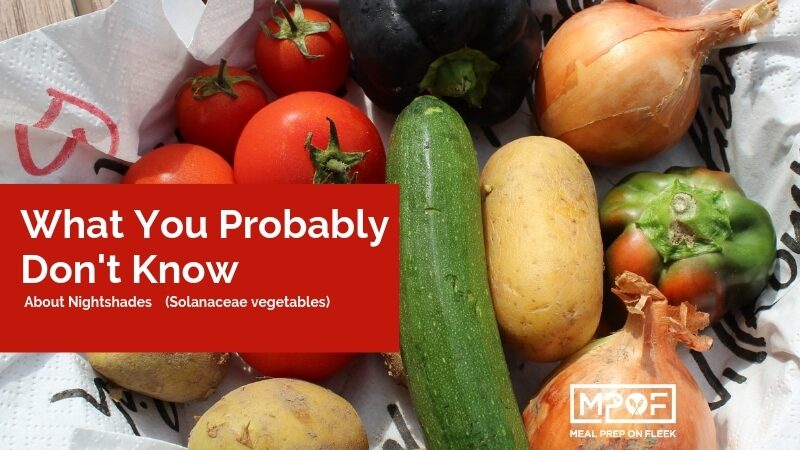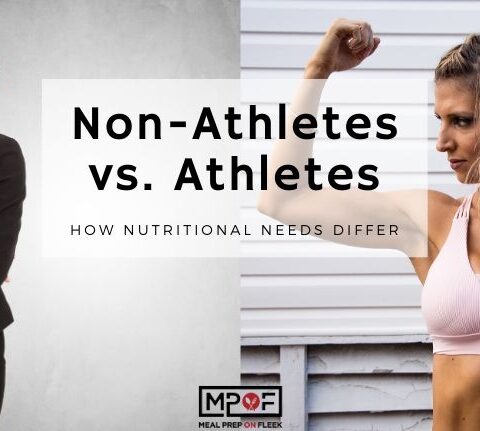Nightshade intolerance can happen in some people after consuming one or more of a specific group of veggies.
Veggies and fruits are good for us, right? Except for maybe when they are bothersome. Maybe you're aware of nightshade intolerance, maybe you have no idea what nightshades are at all, or why you should or shouldn't be concerned about them. Depending on your own individual health, you may or may not experience some discomfort or intolerance after consuming these types of foods.
What Are Nightshades?
Nightshades or Solanaceae refer to a botanical group of plants with similar characteristics such as flower shapes and seed arrangement within the fruit. This botanical family is made up of a large variety of plants. From annual and perennial vines to shrubs and trees, these plants possess qualities that make them suited to be used as medicine, spices, weeds, or ornaments. We don't, however, necessarily eat all those kinds of nightshades, but they're all connected nonetheless.
Examples of Nightshades
A few commonly known edible nightshades include:
- tomatoes
- a variety of peppers
- potatoes
- eggplant
- paprika
- tobacco
Although the vegetables mentioned are known for their nutritional value and overall health, they have been blamed for inflammation and joint pains.
What are the symptoms of nightshade intolerance?
Nightshades produce chemical compounds called alkaloids. These alkaloids include solanine, nicotine, and capsaicin, which are made to help defend the plant against its natural predators. When consumed by bugs, for example, these compounds act as bug spray to eliminate the pests. (Wow! A plant with its own self-defense mechanisms). These alkaloids are generally concentrated in the roots, unripe fruit, stems or leaves of the plants—parts that are not usually consumed by humans.
Although it’s extremely rare, there have been reported cases of human allergic reactions to these alkaloids. Even if there isn't an allergy, a person can have a sensitivity to nightshades. The digestive tract can also contribute to negative human bodily responses. In such a case, the body is not able to properly digest these foods. That's because it lacks the enzymes to do so. Thus when these parts are consumed the following reactions may occur:
- Hives and skin rashes
- Bloating and gas
- Itchiness
- Nausea
- Vomiting
- Heartburn
- Excessive mucus production
- Achy muscles and joints
- Diarrhea
In more severe cases:
- Swelling of the face, mouth, or throat
- Coughing
- Difficulty breathing
- Abdominal pain
- Confusion
- Anxiety
- Shock
- Low pulse
List of Inflammatory Nightshade Vegetables & Fruits
Truth be told there is limited ‘controlled study’ research out there to give any conclusive negative effects on the human body. There have been many documented animal studies which did confirm that nightshade consumption leads to joint inflammation and painful arthritis. However, the effects noted were connected to the way in which their bodies used vitamin D, which is totally different from how the human body does.
Here is a list of nightshade vegetables and fruits that have been said to contribute to inflammation in humans:
- Tomatoes: All varieties
- Potatoes: White and red potatoes, but not sweet potatoes
- Eggplant
- Peppers: Bell peppers, chili peppers, and any red spices
- Paprika
- Tobacco
- Goji berries
Are Nightshades Inflammatory for Everyone?
For anyone suffering from an autoimmune disease, IBS (irritable bowel syndrome), or a sensitive digestive tract, nightshades should be avoided. These nightshades can have some serious health complications, especially if you’re already on a strict diet. Here are a few reasons why you may want to avoid nightshades:
Existing Digestive Disorders
Individuals who suffer disorders such as heartburn, bloating or IBS report that their symptoms worsen whenever they eat nightshades. Yet there is no clear-cut evidence between nightshades and the worsening of these conditions. Some studies, however, show the reverse with a small group suffering from IBS. They reported a reduction in IBS symptoms after taking capsules of red pepper powder for 6 weeks.
Autoimmune Diseases
When someone has an autoimmune disease, their immune system attacks healthy cells, which results in inflammation and tissue damage. Common autoimmune diseases include celiac disease, inflammatory bowel disease (IBD), and rheumatoid arthritis. Nightshades worsen these conditions as they contain chemicals that may stimulate the immune response. However, the National Arthritis Foundation's position on nightshades doesn't necessarily advocate that people cut them out of their diet altogether. It can be a highly subjective experience, different from person to person.
Lectins and leaky gut syndrome
Lectins, a type of protein that may damage the intestinal walls, are also found in nightshades. When the walls of the intestines become damaged, it results in what some medical professionals refer to as ‘leaky gut syndrome.’ In these cases, proteins that would normally remain within the walls of the intestines can enter the bloodstream.
View this post on Instagram
Should You Avoid Nightshades?
Allergies to nightshades, though rare, can pose serious problems to those affected. The research out there is unclear about the extent to which the natural chemical compounds in the nightshades affect pre-existing medical conditions. Yet it remains a possibility that symptoms may worsen. People who feel worse after eating them typically learn to avoid them. If you're not sure, it's always a good idea to talk to a trusted medical professional.
Tips / Rules for Avoiding Nightshades?
If you think you are intolerant to nightshades, here are a few tips that could help you keep track of things:
- Avoid Eating Nightshades for Four Weeks. Once you’ve avoided them for the set period, reintroduce them into your diet for 1 to 2 days to see if you have any reactions.
- Keep A Journal. Record whatever reactions you observe when you consume them. If you observe any severe reactions, you should avoid reintroducing that particular nightshade into your diet.
- Take an Allergy Test. A skin prick test or a blood test can be performed to determine which nightshades you are allergic to.
- Substitute Nightshades from Diet.
Here is a short list of substitutions that can be used:
- White potatoes can be replaced by sweet potatoes
- Tomatoes by beets, carrots, and grapes
- Bell peppers by celery, radishes, and zucchini
Have you heard about nightshades? We would love to hear all about your encounters with nightshades. Do you avoid them for any reason? Do they negatively affect you? Comment below and share your stories with us.








I was diagnosed of RA in 2009. I was put on Naprosyn and after some time i didn't feel any different, so i started on a Natural Rheumatoid Arthritis Formula treatment protocol from RICH HERBS FOUNDATION (ww w. richherbsfoundation. c om), the treatment made a great difference for me, it effectively treated my Rheumatoid Arthritis and symptoms. The swellings, stiffness, fatigue and joint/muscle/body pains has subsided, I feel better overall than i have felt in years.
Great, useful information. You mention an enzyme lacking within the vitamin D? Do you have any more information about this? Are there natural ways to boast this within the body? Thank you again!
It's been a month that I am diagnosed with alopecia areata and searching for a diet.